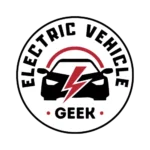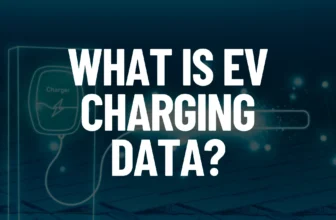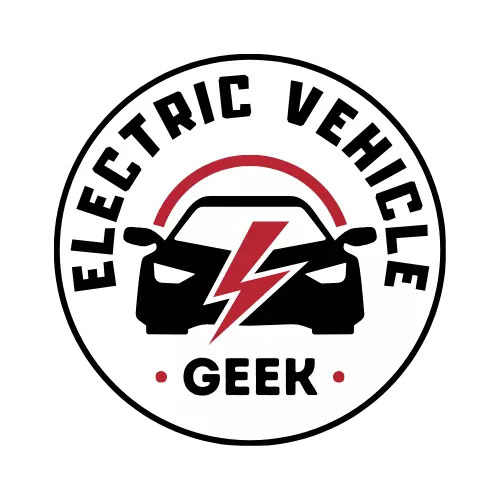Renewable energy integration with EV charging includes charging your EV using electricity from renewable sources such as solar, wind, geothermal, biogas, eligible biomass, and low-impact small hydroelectric sources to power your EV Charging Infrastructure.
The image below illustrates a typical electric vehicle (EV) branch circuit for an EV charging system integrated with solar power generation. The solar EV charging circuit diagram below provides a clear breakdown of the electrical components involved in charging your EV using renewable energy systems such as solar energy.
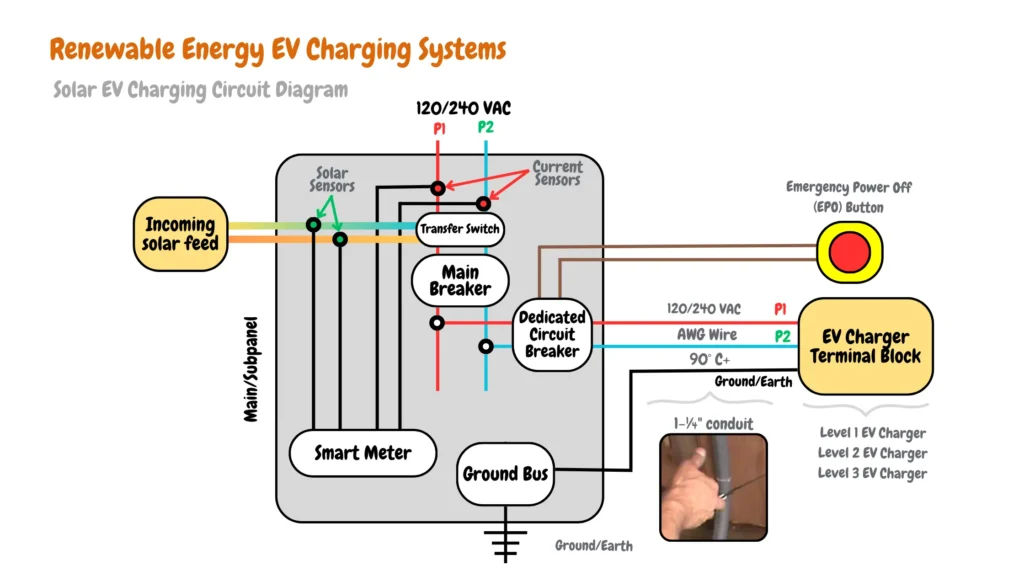
The benefits of using renewable energy in EV charging are reducing the cost of charging your EV, reducing the load on the electricity grid, and reducing greenhouse gas emissions.
Benefits of Using Renewable Energy For EV Charging.
There are many benefits to using Renewable energy for EV charging compared to using grid power. One of the benefits is the low long-term costs of charging your EV. The long-term cost of charging an EV using renewable energy such as solar is the cost of using grid power and is five times less than using a combustion-powered vehicle.
Another benefit of using renewable energy to power your electric vehicle is reducing the load on the aging electric system, which, according to projections, would not be able to handle the growth of electric cars in the year 2030; we would require more than 50% electrical grid upgrade by the year 2030 to be able to fill the gap of power demand required by new electric vehicles which are approximately 26.4 million on the road by 2030, up from 3 million in 2023.
Another advantage of using renewable energy to charge your EV is that renewable energy is more environmentally friendly than traditional fossil fuels; renewable energy is much cleaner and doesn’t pollute air or water in the long-term battle of saving our climate.
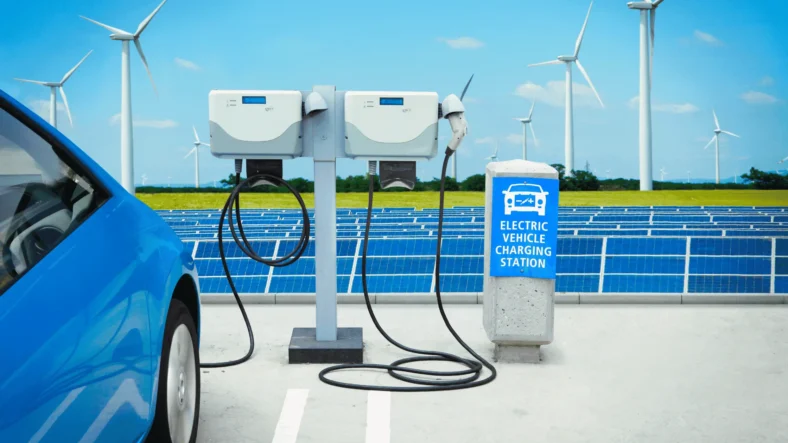
President Biden’s Inflation Reduction Act, Bipartisan Infrastructure Law, and other federal initiatives promote the use of renewable energy by giving tax credits for purchases of new and used EVs—helping bring the benefits of clean energy to communities across the nation.
Smart Charging and Load Balancing
Renewable energy power sources have their benefits and disadvantages. Still, by using smart EV charging, we can manage the load on the EV Charging infrastructure to improve EV charging using renewable energy by tapping into electric grids or energy storage sources when power from the power generation sources is reduced. Allowing remote communities and individuals to generate their power, decreasing their reliance on the already congested electric grid.
Smart charging is also beneficial for scheduling charging and load management using renewable energy sources such as solar power. Since solar power availability varies, EV owners can use a smart EV charger that will only charge using solar power during the day and switch to energy storage batteries or the electric grid at night when there is no sun.
Renewable Energy Use in the United States.
Approximately 60% of the electricity generated in the United States is derived from non-renewable sources such as natural gas and coal.
On a positive note, renewable energy sources now contribute over 20% to the nation’s electricity consumption, with this percentage steadily increasing. In electric vehicle chargers, companies involved in manufacturing, servicing, and operating them are adopting environmentally friendly practices. They achieve this by acquiring renewable energy certificates (RECs) to counterbalance the energy consumption of charging electric vehicles.
Wind and hydropower are the most prevalent renewable energy sources, accounting for 9.2% and 6.3%, respectively. Solar energy closely follows suit in the renewable energy landscape.
The Challenge Of Using Renewable Energy to Charge Your EV.
One of the roadblocks to adopting renewable energy to charge EVs is the high initial costs involved in setting up a renewable energy-powered EV charging infrastructure. However, many rebates and incentives are available for installing solar panel charging stations. It is also important to note that, in the long run, using renewable energy. Consists of low maintenance costs due to the absence of electricity bills.
Using renewable energy in large-scale EV charging stations is also a challenge in public charging stations that require a lot of power due to the high costs of setting up clean-energy EV charging stations.
Solar EV charging and renewable energy installation costs are lower for smaller homes; however, installing energy storage batteries and backup systems increases the costs of large-scale EV charging stations.
There is also the challenge of navigating the complex landscape of using renewable energy, where you will find varying incentives, pricing, performance, and regional incentives especially when it comes to back-up systems and energy storage options.
Suppose someone plans to install large-scale renewable energy EV charging businesses; in that case, they should be prepared to face hurdles in warranties, insurance, and performance guarantees associated with the risk of using renewable energy.
Summary.
A robust charging infrastructure is imperative for the synergy between renewable energy and EV charging to reach its full potential. Charging stations must be ubiquitous, accessible, and compatible with various vehicles. Governments and private organizations must collaborate to invest in research and development, providing incentives for the widespread deployment of clean energy and charging systems.
To solve some of the challenges associated with implementing renewable energy into EV charging, we would call for transparency regarding warranties, insurance, and performance guarantees for businesses, EV Charging station businesses, and small-scale EV charging installations to facilitate decision-making regarding the use and installation of renewable energy charging stations in the United States.

About the Author: James Ndungu
James Ndungu, founder and editor-in-chief of Electric Vehicle Geek, brings over five years of hands-on experience in Electric Vehicle Supply Equipment (EVSE) selection, permitting, and installation. He specializes in assisting businesses and homeowners in the United States with a seamless transition to electric vehicles.
As a certified EV charger installer and holder of advanced certifications, including the EVITP (Electric Vehicle Infrastructure Training Program), Diploma in Electric Vehicle Technology, and Diploma in Engineering Fundamentals of Electric Vehicles, I provide expert guidance and in-depth reviews on the latest EV charging equipment.
